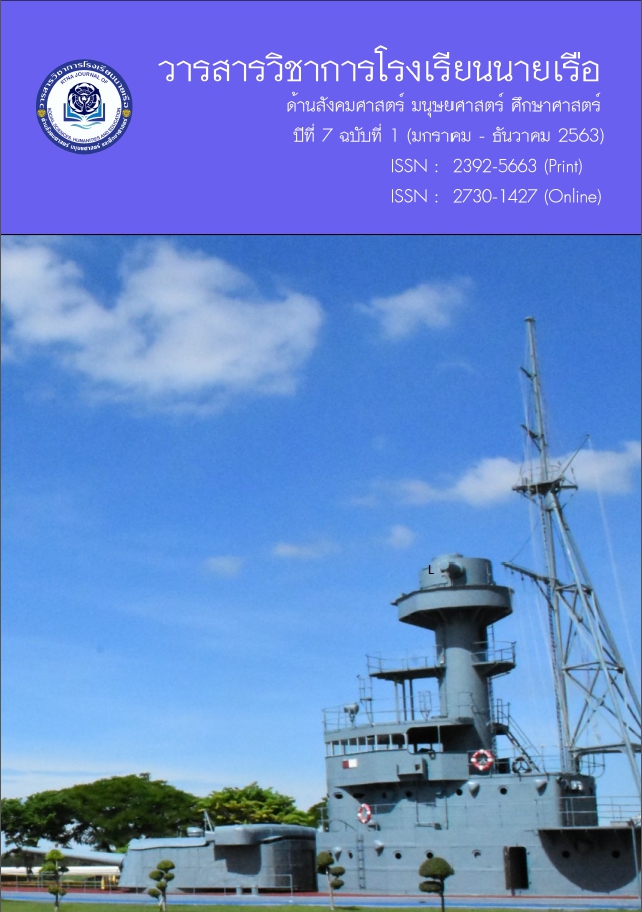Project Evaluation for development of Royal Thai Naval Cadet in relation to clean navy policy Year 2019 by Using CIPP Model
Keywords:
Clean Navy Policy, Development of Royal Thai Naval Cadet, Project EvaluationAbstract
The research and evaluation of "guidelines for the development of Royal Thai Naval cadets in accordance with the Clean Navy Policy" project is implemented in accordance with the " Clean Navy Policy" to respond to the administration of the Navy with transparency, which also achieving and responding to government policies. The research objective is to create a good example of Royal Thai Naval Cadets to the society who can apply knowledge and intelligence to develop society as well as to develop body and mind to be strong, and to be a leader for society. They will maintain the their honor and dignity on the basis of correctness to social convention. The method of research study is done by monitoring and evaluating of activities: there are 6 activities in total on various missions. The sample population is a group of Royal Thai Naval Cadets participating in the said project activities. The researcher conducted the data analysis by using Daniel Z strand beam CIPP Model. Our aim is to assess 4 things as follows: 1. Context: to develop the purpose of the project, 2. Input: for project design, 3. Process: to assess the process of operation according to the project, and 4. Product: to assess the achievement of the project. The results of this research give the cadet knowledge and understanding about leadership principles in community and society development as well as building confidence in leadership as a role for communities and society, which is considered to create responsibility to themselves, to the society, and to the nation. They will learn to sacrifice, to be a giver, to socialize, and to exchange ideas. Furthermore, they will have to transfer of their knowledge of leadership and their own knowledge in order to develop in a good way as well as creating a working network with the community which collaborates with internal and external unit. The most important aspect of the implementation of the cadets' projects is considered as a guideline to instill in them the honesty "grow up not to cheat"
References
คณะกรรมการป้องกันและปราบปรามการทุจริตแห่งชาติ. (2557). ยุทธศาสตร์ชาติว่าด้วยการป้องกันและปราบปรามการทุจริต ระยะที่ 2 (พ.ศ.2556-2560). สืบค้น 22 เมษายน 2562, จาก www.nacc.go.th/article_attact/image1543.pdf
ดวงหทัย อินทะชัย. (2553). กระบวนการทุจริตคอร์รัปชั่นในการบรรจุและแต่งตั้งพนักงานส่วนท้องถิ่น.(วิทยานิพนธ์ปริญญามหาบัณฑิต). อุบลราชธานี: มหาวิทยาลัยอุบลราชธานี.
ทิพาวดี เมฆสวรรค์. (2543). พฤติกรรมการคอร์รัปชั่นของข้าราชการไทย. กรุงเทพฯ: สำนักงานคณะกรรมการข้าราชการพลเรือน.
นวลน้อย ตรีรัตน์. (2546). การมีส่วนร่วมของประชาชนในการตรวจสอบการดำเนินงานขององค์การบริหารส่วนตำบล. ม.ป.ท.: ม.ป.พ.
บุญชุม ศรีสะอาด. (2545). การวิจัยเบื้องต้น. (พิมพ์ครั้งที่ 7). กรุงเทพฯ: สุวีริยาสาส์น.
ปกรณ์ ประจัญบาน. (2552). ระเบียบวิธีวิจัยทางสังคมศาสตร์. พิษณุโลก: รัตนสุวรรณการพิมพ์.
ปกรณ์ ประจัญบาน. (2553). สถิติขั้นสูงสำหรับการวิจัยและประเมิน. (พิมพ์ครั้งที่ 3). พิษณุโลก: มหาวิทยาลัยนเรศวร.
ผาสุก พงษ์ไพจิตร. (2537). แผนการแก้ปัญหาคอร์รัปชั่นในระบบราชการ. สืบค้น 22 เมษายน 2562, จาก http://gg.gg/jm2ii
ผาสุก พงษ์ไพจิตร และคณะ. (2545). รายงานผลการวิจัย ธุรกิจ รัฐ และคอรัปชั่น. กรุงเทพฯ: จุฬาลงกรณ์มหาวิทยาลัย.
พรศักดิ์ ประกอบสิน. (2551). การกระทำโดยทุจริต. สืบค้น 22 เมษายน 2562, จาก http://gg.gg/jm2is
มหาวิทยาลัยมหิดล. ศูนย์บริหารจัดการความเสี่ยง. (ม.ป.ป.). ความรู้เกี่ยวกับการทุจริต. นครปฐม:
Downloads
Published
Issue
Section
License
The author has the sole responsibility for the material published in RTNA Journal of Social Sciences, Humanities, and Education, which the editorial team may not agree on that material.
RTNA Journal of Social Sciences, Humanities, and Education owns the copyright of the text, the illustration, or other material published in the journal. No parts or the whole of the material published may be disseminated or used in any form without first obtaining written permission from the academy.






